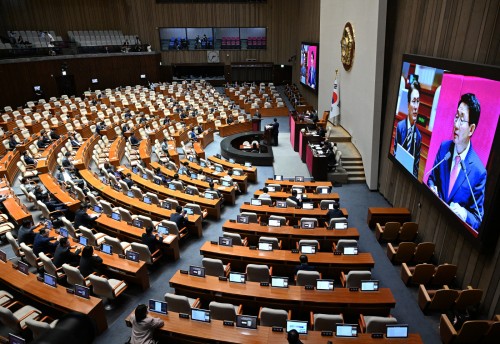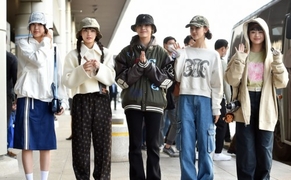 |
| Prime Minister Kim Min-seok answers questions from Rep. Kim Sang-hoon of the People Power Party during an economic policy session at the National Assembly in Seoul on September 17. / Source: Song Ui-joo |
Lawmakers clashed over economic policies during a government question session at the National Assembly on September 17, with the ruling party highlighting the stock market’s record highs while the opposition attacked pro-labor legislation and tougher corporate governance reforms.
Rep. Lee Un-ju of the Democratic Party (DP) opened the debate by praising the recent KOSPI surge, saying the government’s expansionary fiscal policy was necessary. “Korea is speeding up its entry onto a normal track. The KOSPI keeps hitting record highs,” she said, urging for a “new paradigm” in state management to tackle global economic shifts. “Prudent fiscal policy matters, but squeezing too hard is not the answer. Money must circulate in the domestic market.”
Rep. Kwon Chil-seung of the DP echoed her view, pointing out that the previous administration had stressed fiscal soundness but failed to meet its own rules on budget deficits.
On the other side, Rep. Kim Sang-hoon of the People Power Party (PPP) blasted the Yellow Envelope Act — amendments to the Labor Union and Labor Relations Adjustment Act — calling it a “guarantee of illegal strikes.” He warned that companies were preparing to flee Korea, likening the government’s direction to Venezuela’s economic collapse. “The government has chained companies’ hands and given labor unions sledgehammers,” he said, accusing President Lee Jae-myung’s administration of pursuing union-biased policies.
Prime Minister Kim Min-seok countered that the law reflected long-standing discussions and would form a foundation for growth despite concerns.
Kim also criticized the so-called “stronger” amendments to the Commercial Act, which include measures such as mandatory treasury share cancellations. “If shareholders demand higher dividends instead of investment, how can companies plan for the future?” he asked.
Deputy Prime Minister and Finance Minister Koo Yoon-cheol replied that Korea’s dividend payout ratio was about 30%, lower than China’s 40%. “Companies making money should pay dividends, but we will also help them find new opportunities for growth,” he said.
PPP lawmaker Lee Hun-seung further attacked government consumer coupon programs, calling them “populist cash handouts” that would worsen both national and local finances, recalling failures under the previous Moon administration.
Trade Minister Kim Jung-kwan was also pressed on ongoing tariff negotiations with the United States. He declined to disclose specifics but stressed that talks were being pursued “intensively to protect Korea’s national interest and corporate competitiveness.”
Most Read
-
1
-
2
-
3
-
4
-
5
-
6
-
7





















